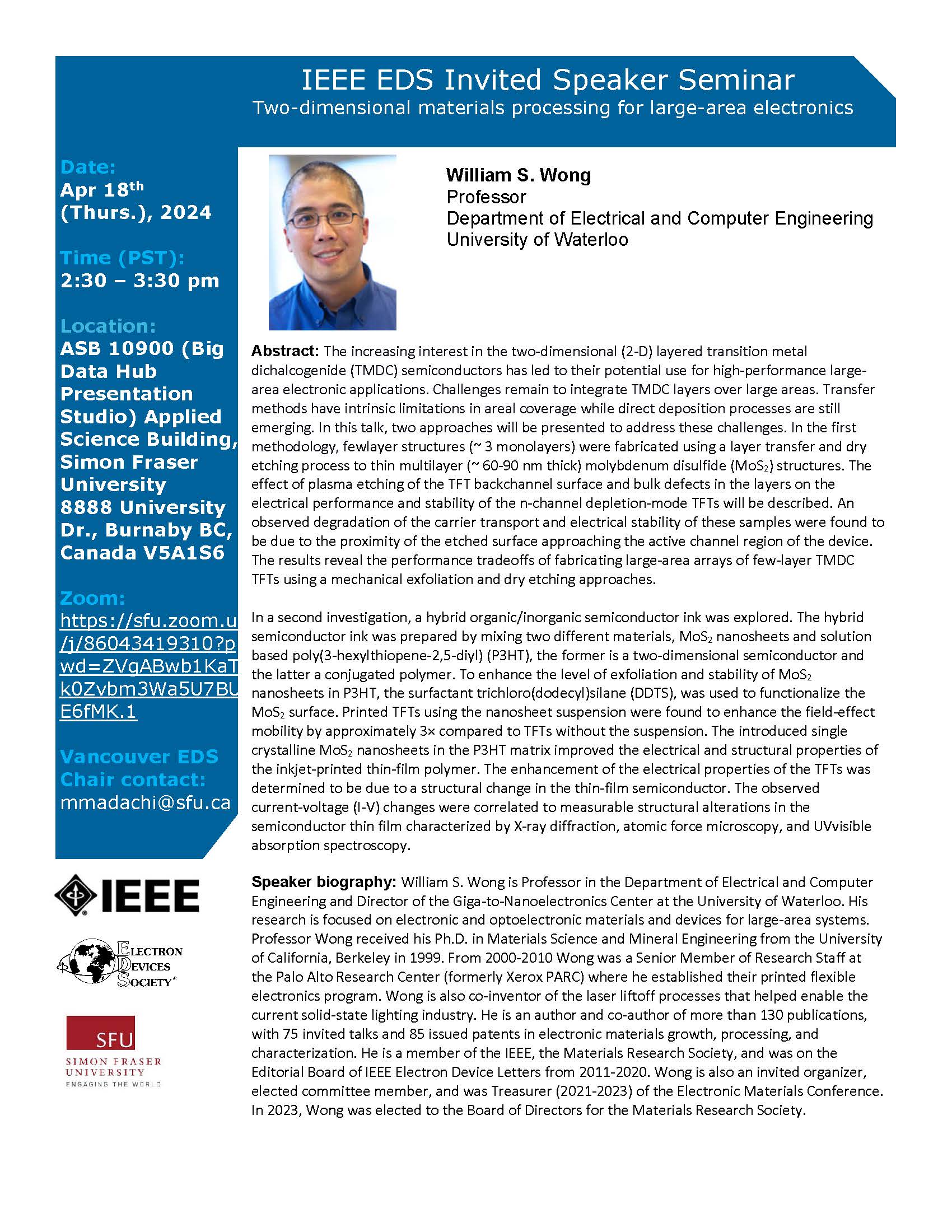IEEE EDS Invited Speaker Prof. William Wong, "Two-dimensional materials processing for large-area electronics"
Date and Time
Location
Hosts
Registration
-
 Add Event to Calendar
Add Event to Calendar
Loading virtual attendance info...
- 8888 University Dr.
- Burnaby, British Columbia
- Canada V5A 1S6
- Building: Applied Science Building
- Room Number: ASB 10900 (Big Data Hub Presentation Studio)
Speakers
Prof. William Wong of University of Waterloo
Two-dimensional materials processing for large-area electronics
Abstract: The increasing interest in the two-dimensional (2-D) layered transition metal dichalcogenide (TMDC) semiconductors has led to their potential use for high-performance large-area electronic applications. Challenges remain to integrate TMDC layers over large areas. Transfer methods have intrinsic limitations in areal coverage while direct deposition processes are still emerging. In this talk, two approaches will be presented to address these challenges. In the first methodology, fewlayer structures (~ 3 monolayers) were fabricated using a layer transfer and dry etching process to thin multilayer (~ 60-90 nm thick) molybdenum disulfide (MoS2) structures. The effect of plasma etching of the TFT backchannel surface and bulk defects in the layers on the electrical performance and stability of the n-channel depletion-mode TFTs will be described. An observed degradation of the carrier transport and electrical stability of these samples were found to be due to the proximity of the etched surface approaching the active channel region of the device. The results reveal the performance tradeoffs of fabricating large-area arrays of few-layer TMDC TFTs using a mechanical exfoliation and dry etching approaches.
In a second investigation, a hybrid organic/inorganic semiconductor ink was explored. The hybrid semiconductor ink was prepared by mixing two different materials, MoS2 nanosheets and solution based poly(3-hexylthiopene-2,5-diyl) (P3HT), the former is a two-dimensional semiconductor and the latter a conjugated polymer. To enhance the level of exfoliation and stability of MoS2 nanosheets in P3HT, the surfactant trichloro(dodecyl)silane (DDTS), was used to functionalize the MoS2 surface. Printed TFTs using the nanosheet suspension were found to enhance the field-effect mobility by approximately 3× compared to TFTs without the suspension. The introduced single crystalline MoS2 nanosheets in the P3HT matrix improved the electrical and structural properties of the inkjet-printed thin-film polymer. The enhancement of the electrical properties of the TFTs was determined to be due to a structural change in the thin-film semiconductor. The observed current-voltage (I-V) changes were correlated to measurable structural alterations in the semiconductor thin film characterized by X-ray diffraction, atomic force microscopy, and UVvisible absorption spectroscopy.
Biography:
Speaker biography: William S. Wong is Professor in the Department of Electrical and Computer Engineering and Director of the Giga-to-Nanoelectronics Center at the University of Waterloo. His research is focused on electronic and optoelectronic materials and devices for large-area systems. Professor Wong received his Ph.D. in Materials Science and Mineral Engineering from the University of California, Berkeley in 1999. From 2000-2010 Wong was a Senior Member of Research Staff at the Palo Alto Research Center (formerly Xerox PARC) where he established their printed flexible electronics program. Wong is also co-inventor of the laser liftoff processes that helped enable the current solid-state lighting industry. He is an author and co-author of more than 130 publications, with 75 invited talks and 85 issued patents in electronic materials growth, processing, and characterization. He is a member of the IEEE, the Materials Research Society, and was on the Editorial Board of IEEE Electron Device Letters from 2011-2020. Wong is also an invited organizer, elected committee member, and was Treasurer (2021-2023) of the Electronic Materials Conference. In 2023, Wong was elected to the Board of Directors for the Materials Research Society.
Email:
Address:200 University Ave W, , Waterloo, Canada, N2L 3G1


